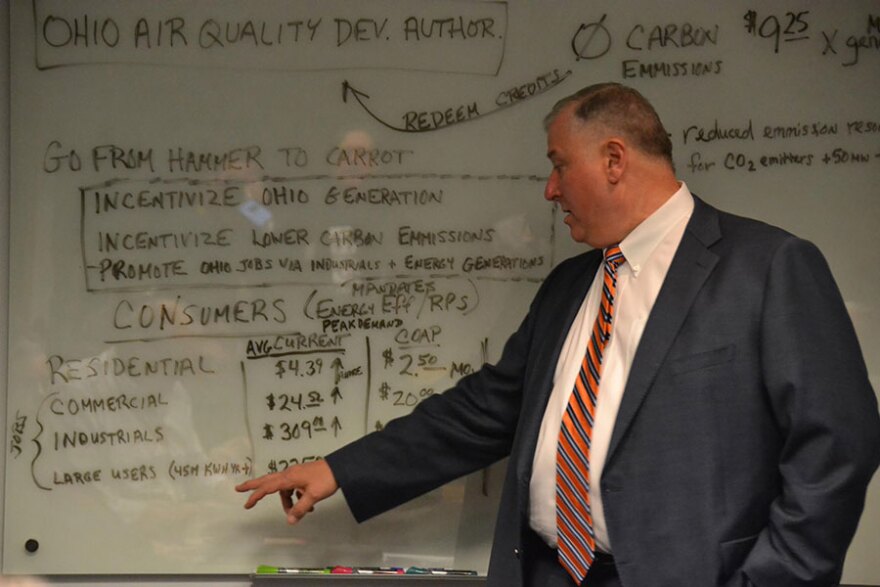Jurors are due back in a Cincinnati federal courtroom Tuesday for the resumption of the trial for former Ohio House Speaker Larry Householder and former Ohio Republican Party chairman Matt Borges.
The case centers around what prosecutors call the largest bribery scheme in Ohio history. Prosecutors allege Householder used his position of power to acquire more than $61 million from utility company FirstEnergy, in order to pass House Bill 6, also known as the nuclear bailout law. Borges is accused of bribing a political consultant who was working to overturn the law.
Opening arguments
Both sides selected a jury Jan. 20 and held opening arguments the following Monday. Assistant U.S. Attorney Emily Glatfelter used her portion to set the table for the prosecution, saying Householder “sold the Statehouse” and that “his bank was FirstEnergy.”
“He ripped off the people he was elected to serve. Millions of dollars of bribe payments to pay for his political and personal gain,” Glatfelter told jurors. One of Householder’s attorneys, Steve Bradley, told the court that the “government got it wrong.”
“Larry was never bribed to advance this legislation," Bradley said.
Bradley tried to paint Householder as a political outsider who fought for policies he believed in. He says there was no quid pro quo connected to the bailout law and told jurors they would not hear any evidence proving one. He said Householder is only guilty of being a good politician and fundraising for likeminded politicians who supported the same causes.
“These campaigns cost a ton of money and one of the things he was good at was fundraising,” Bradley said.
Initial testimony
The prosecution’s first and only witness to date has been Blane Wetzel, the FBI agent who built the case against Householder. When he took the stand Tuesday, he said the probe started with a tip from a “concerned individual.”
Wetzel told the court that he and other agents built the case with 250 subpoenas, which included some for bank and phone records, as well as reading through tens of thousands of documents. Wetzel spoke at length about the earliest conversations between Householder and FirstEnergy executives, which were alleged to have happened in January 2017, when Householder traveled to Washington for President Trump. Wetzel said Householder used his time in the nation’s capital to have dinner with FirstEnergy executives and plot their next course of action.
COVID halts proceedings
Wetzel was scheduled to once again take the stand on Wednesday, but court proceedings were called off for the day after a juror fell ill. It was later confirmed that that juror contracted COVID-19, and court sessions were canceled for the rest of the week. Proceedings on Monday were later canceled as well. Wetzel is expected to resume his testimony on Tuesday.
Matt Borges also on trial
While Larrry Householder has gotten most of the headlines, the former Ohio GOP chair Borges is a co-defendant. He’s also charged with bribery and racketeering, although the circumstances are different. Prosecutors allege Borges tried to bribe Tyler Ferhman, a Republican strategist, with $15,000 in exchange for information on the anti-bailout campaign. Ferhman was working on the effort to repeal House Bill 6, which Householder and Borges fought to keep in place.
Two other people charged, Householder strategist Jeff Longstreth and FirstEnergy Solutions lobbyist Juan Cespedes, have pleaded guilty and are working with prosecutors. A fifth person, Neil Clark, a prominent lobbyist who was close to Householder, was also charged, but died by suicide in March 2021.
What to expect going forward
Wetzel is expected to once again take the stand on Tuesday. The court is also expected to hear from former legislators who say they felt pressured by Householder and his allies to vote for the nuclear bailout law. Prosecutors could also play audio that Ferhman allegedly secretly gathered during conversations with Householder.
It’s also been reported that Ohio Attorney General Dave Yost has been subpoenaed and could testify. The trial is expected to take up to six weeks.



